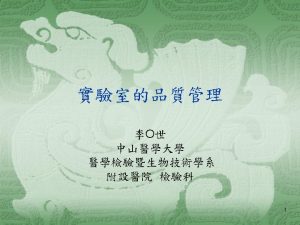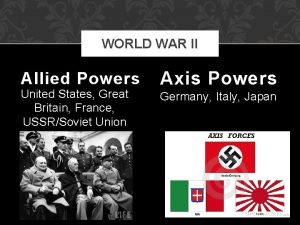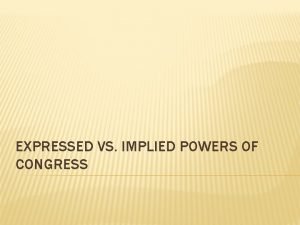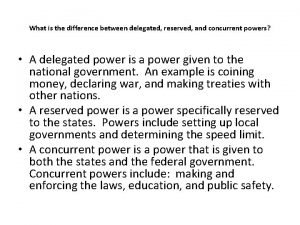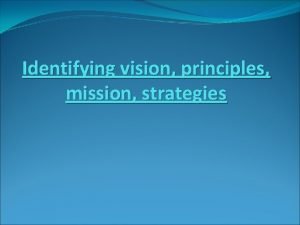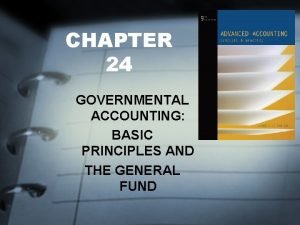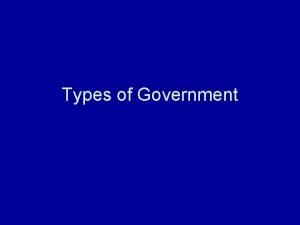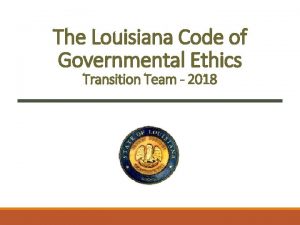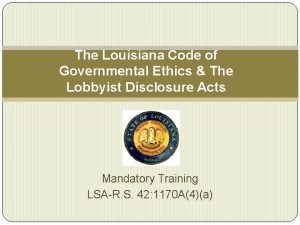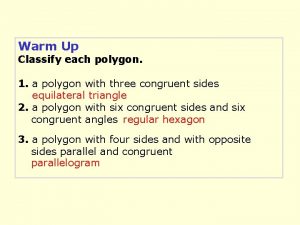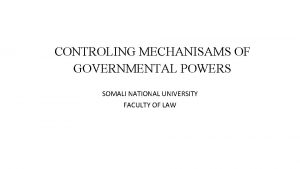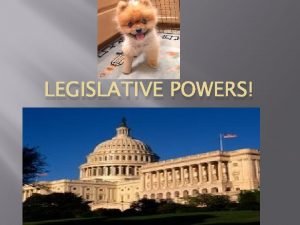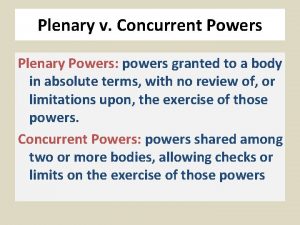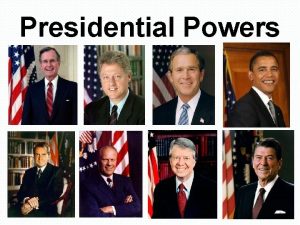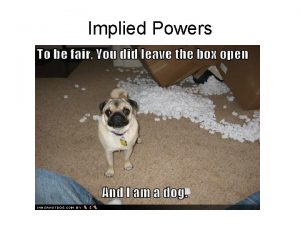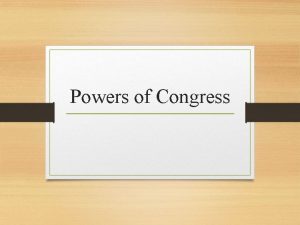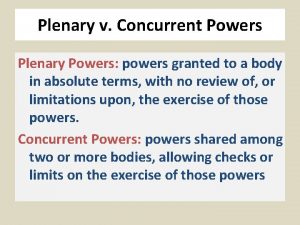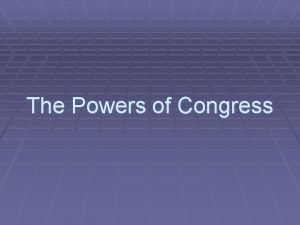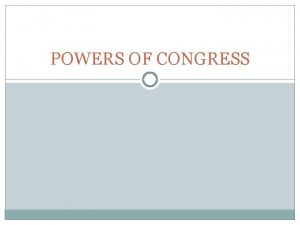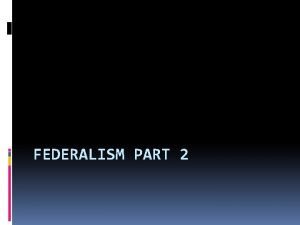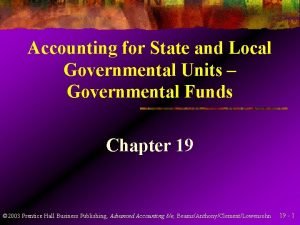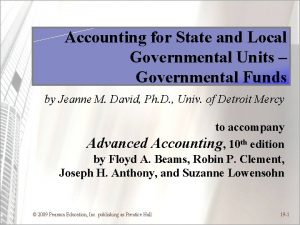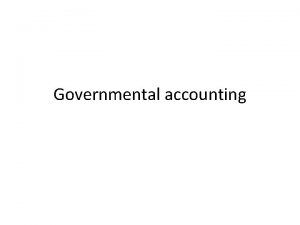UNIT SIX CONTROLING MECHANISAMS OF GOVERNMENTAL POWERS CONTROLING

















- Slides: 17

UNIT SIX CONTROLING MECHANISAMS OF GOVERNMENTAL POWERS

CONTROLING MECHANISMS OF GOVERNMENTAL POWERS • The concern of administrative law is regulating the powers of administrative agencies, lest /in case of abuse of such powers, may cause prejudice to public interest in general and to individual interest in particular. • Administrative law puts appropriate controlling mechanisms that restrain administrative agencies within the scope of the powers entrusted to them.

• So, this unit tries to outline the various modalities of controlling the powers of the administrative agencies.

The Need for Controlling the Powers of Government • There are great possibilities that the three powers of government may be concentrated in the hands of many administrative agencies. • The delegation of rulemaking and adjudicating powers to administrative agencies become an inevitable phenomenon of the complex technological world.

• In addition to the broad discretionary administrative powers entrusted to the executive organ and its agencies by the constitution, the delegation of rulemaking and adjudicating powers to these agencies, pose an inevitable threat on individual freedom and liberty.

• As proposed by the French political philosopher, Montesquieu, where the tripartite powers are merged or combined in the same person/in the same body, there can be no liberty as the life and liberty of the subject would be exposed to arbitrary/indiscriminate control.

• So, the fear created by the concentration of the tripartite powers (administrative, legislative and judicial) in the hands of the same person or body of persons combined with the discretionnary nature of administrative powers which is subject to abuse, necessities for devising legal and institutional procedures that are important to control the arbitrary exercise of powers by administrative agencies

• The principle of separation of state power is proved to be an effective mechanism for controlling abuse of powers. • The division of state power between the legislature, executive and the judiciary can best protect individual liberty and democracy. • The purpose of the principle of separation of power is to prevent any single branch of the government from becoming too powerful, providing a series of checks and balances;

• it is to bend dictatorship and arbitrariness and to promote liberty, democracy and good governance by creating a system of check and balance. • However, the doctrine of separation of state power among the three branches of government should not be interpreted in its extremity.

• The delegation of rulemaking and adjudicating powers to administrative agencies is becoming an inevitable and blessing phenomenon in this technologically advanced and complicated world. • Thus, acknowledging the inevitability and importance of the delegation of relatively broad discretionary powers to administrative agencies in this complex world;

• appreciating the resultant possibilities of concentration of tripartite powers in the hands of a government agency, and the possibility these powers may be abused unless checked, there comes the need to devise the mechanism for controlling the powers of these agencies.

• The existence of various checking mechanisms of power may induce/encourage administrative agencies to use the powers entrusted to them in the interest of the public.

Controlling Mechanisms • There are different devices that can be used to control the powers of administrative agencies in many jurisdictions. • There are different controlling mechanisms in checking the powers of administrative agencies.

• Some of the controlling mechanisms are: • �Internal administrative review by superior officials; • �Parliamentary control; • �Political control; • �External administrative review by tribunals; • �External scrutiny and recommendations by Ombudsmen and other watchdog institutions and • �Judicial control •

• Most of these controlling mechanisms are introduced through legislation in many jurisdictions. • The controlling mechanisms were designed to improve the quality of administrative decision-making by providing effective alternative checking mechanisms that would be appropriate under the given circumstance.

• Putting the appropriate controlling or checking mechanisms in place would promote the following benefits: • § Improves the quality, efficiency and effectiveness of government decision-making generally;

• § Enables people to test the legality and merits of decisions that affect them; • § Provides mechanisms for ensuring that the government acts within its lawful powers; • § Provides mechanisms for achieving justice in individual cases and • § Contributes to the accountability system for government decisionmaking.
 Motivating example
Motivating example Process of controling
Process of controling Was the united states on the axis powers or allied powers?
Was the united states on the axis powers or allied powers? Causes of wwi (mania)
Causes of wwi (mania) Expressed vs implied powers of congress
Expressed vs implied powers of congress Implied vs enumerated powers
Implied vs enumerated powers Implied power example
Implied power example Difference between delegated and reserved powers
Difference between delegated and reserved powers Congress informal powers
Congress informal powers Ngo mission and vision examples
Ngo mission and vision examples Government accounting basics
Government accounting basics Governmental systems
Governmental systems Louisiana code of governmental ethics
Louisiana code of governmental ethics Louisiana code of ethics
Louisiana code of ethics Ngo meaning
Ngo meaning Nongovernmental health agencies are funded primarily by:
Nongovernmental health agencies are funded primarily by: Classify each polygon
Classify each polygon Unit 10, unit 10 review tests, unit 10 general test
Unit 10, unit 10 review tests, unit 10 general test
